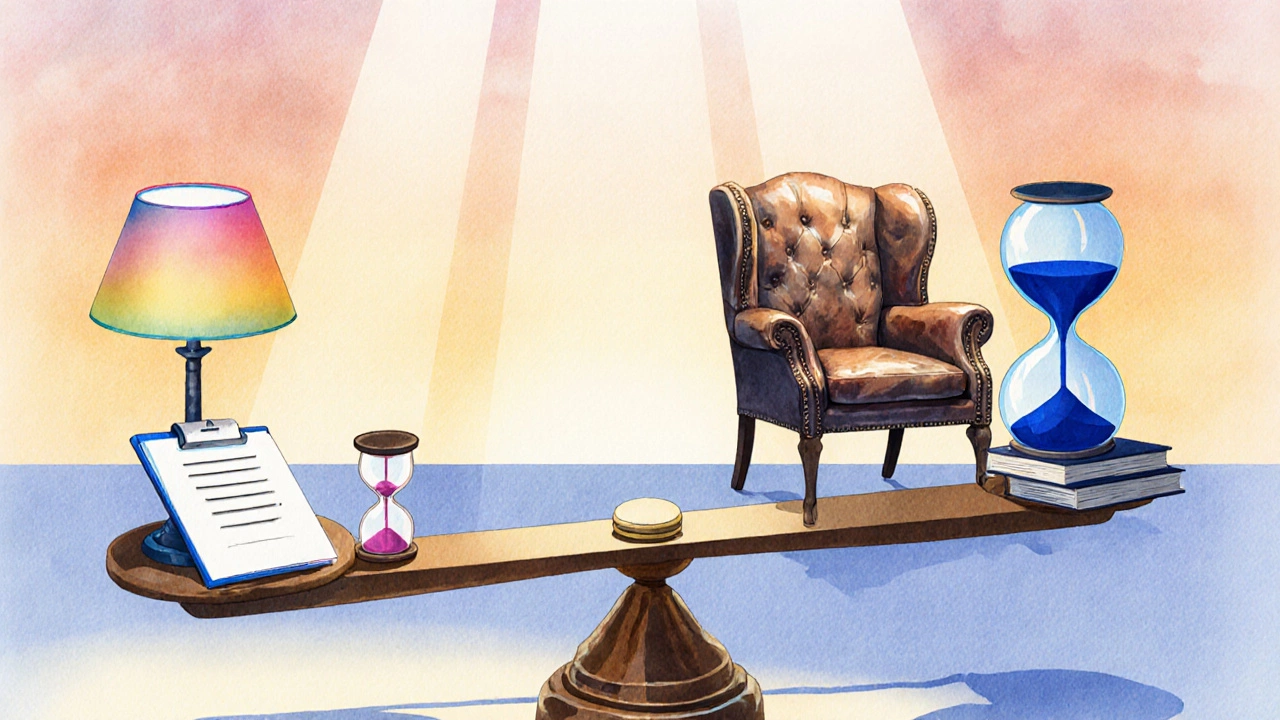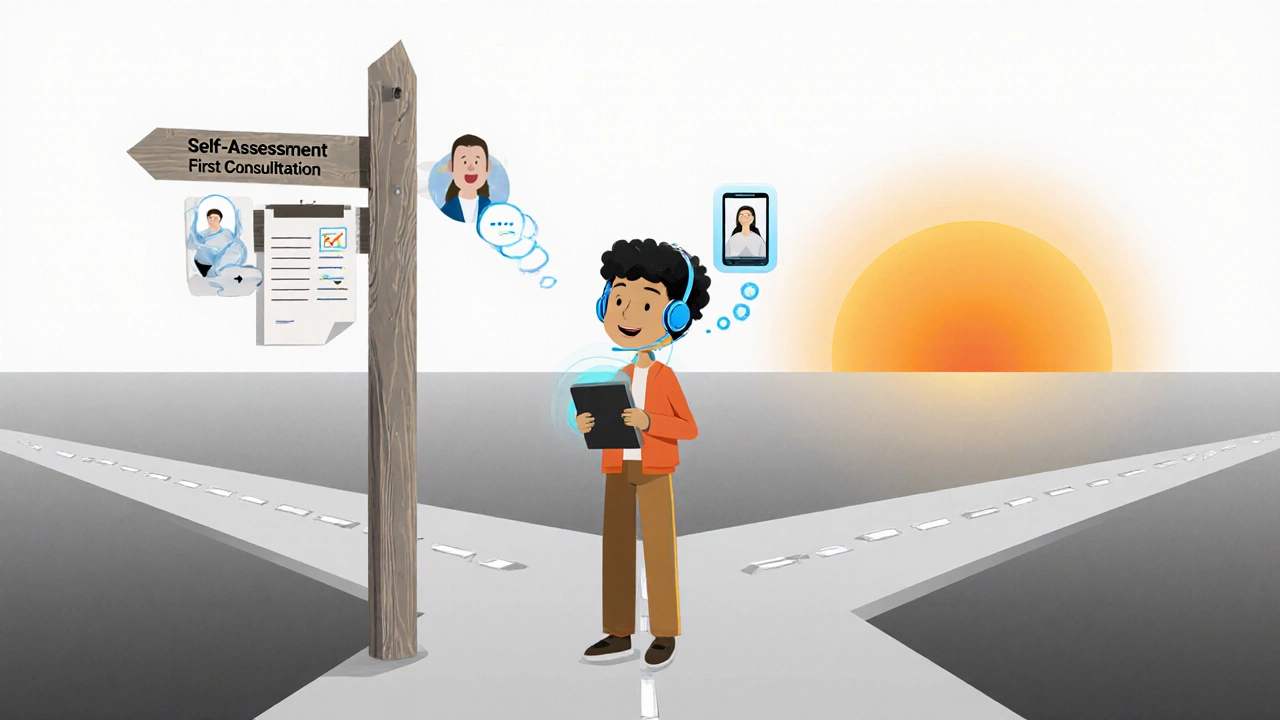- Home
- Mental Health
- Do I Need Counseling or Therapy? A Practical Guide

Do I Need Counseling or Therapy? A Practical Guide
Counseling or Therapy Decision Tool
Which Mental Health Support Is Right for You?
This tool helps you determine whether counseling or therapy is more appropriate for your needs based on your specific situation and goals.
This recommendation is based on your answers:
Key Takeaways
- Counseling focuses on specific issues and short‑term support; therapy digs deeper into patterns and can be longer.
- Both can help anxiety, depression, stress, grief, and relationship challenges.
- Choosing the right help depends on the problem’s complexity, your goals, and the professional’s qualifications.
- Start by assessing your needs, checking credentials, and arranging a brief introductory session.
- Never hesitate to switch if the first fit doesn’t feel right - the right match matters most.
Feeling stuck, overwhelmed, or simply curious about professional help? The line between counseling and therapy often blurs, leaving many wondering which path suits them. This guide cuts through the jargon, outlines the core differences, and gives you a clear roadmap to decide what you need right now.
What Is Counseling?
Counseling is a goal‑oriented, short‑term service that helps people address specific problems such as stress at work, relationship disputes, or coping with a recent loss. Counselors typically use practical techniques, active listening, and solution‑focused strategies to empower clients to make immediate changes.
What Is Therapy?
Therapy (often called psychotherapy) is a longer‑term, in‑depth process that explores underlying thoughts, emotions, and behavioral patterns. Therapists work to uncover root causes of distress, reshape maladaptive habits, and promote lasting mental‑health growth.

How Do You Decide Between Them?
Think of the decision as a scale. On one side you have the urgency and specificity of the issue; on the other, the depth you want to explore. Answer these three quick questions:
- Is the problem recent and situational (e.g., a conflict with a coworker) or chronic (e.g., long‑standing anxiety)?
- Do you need actionable tools now, or are you ready to explore deeper emotional roots?
- How much time are you willing to commit - weeks, months, or years?
If you answered “yes” to the first two and prefer a short timeline, counseling is likely the right fit. If your answers point to deeper patterns and you can invest in a longer journey, therapy may be more beneficial.
Comparing Counseling and Therapy
| Aspect | Counseling | Therapy |
|---|---|---|
| Typical Duration | 4‑12 sessions | 3‑12 months or longer |
| Focus | Specific, present‑day issues | Underlying patterns, past experiences |
| Professional Designation | Counsellor or Licensed Clinical Social Worker | Psychotherapist (often a psychologist, psychiatrist, or licensed therapist) |
| Typical Techniques | Solution‑focused, skill‑building, crisis management | Cognitive Behavioral Therapy (CBT), psychodynamic, EMDR, etc. |
| Cost (UK average) | £40‑£70 per hour | £70‑£120 per hour |
| Insurance Coverage (NHS) | Often covered after GP referral | Usually covered after GP referral; private options vary |
Common Mental‑Health Concerns and Which Service Helps Most
Below are everyday issues, the typical severity, and the recommended approach.
- Depression: Moderate to severe cases benefit from therapy (especially CBT or interpersonal therapy). Light‑to‑moderate episodes can start with counseling for coping strategies.
- Anxiety: Both counseling (stress‑management techniques) and therapy (exposure‑based CBT) are effective; therapy is preferred for chronic anxiety.
- Stress: Short‑term counseling often suffices, providing time‑management tools and relaxation methods.
- Grief: Initial counseling helps navigate immediate loss; therapy can support prolonged or complicated grief.
- Relationship Issues: Couples counseling focuses on communication, while therapy may address deeper attachment patterns.
Choosing the Right Professional
Credentials matter. Here’s a quick cheat‑sheet:
- Psychologist - Holds a doctoral degree (PhD or PsyD), trained in assessment and evidence‑based therapies.
- Psychiatrist - Medical doctor who can prescribe medication and often provides psychotherapy.
- Counsellor - Typically has a postgraduate certificate; focuses on practical support and short‑term interventions.
- Therapist - Broad term; could be a counsellor, psychologist, or social worker depending on training.
Always verify registration with bodies such as the British Association for Counselling and Psychotherapy (BACP) or the UK Council for Psychotherapy (UKCP).

Practical Steps to Get Started
- Self‑Assessment: Write down the issue, its duration, and how much it interferes with daily life.
- GP Referral: In the UK, a referral to NHS counseling or therapy services often unlocks free support.
- Search Registered Providers: Use the BACP or UKCP directories to find local professionals.
- Check Logistics: Verify session length, cost, cancellation policy, and whether they offer virtual appointments.
- Initial Consultation: Most clinicians offer a 15‑minute intro call. Prepare questions about their approach, experience with your issue, and expected timeline.
- Set Goals: Agree on measurable objectives (e.g., reduce panic attacks from daily to twice a week).
- Review After 4‑6 Sessions: Evaluate progress. If you feel stuck, discuss alternatives or consider switching to a different modality.
Pitfalls to Avoid
- Assuming “counselling = cheap” - quality matters more than price.
- Skipping the credential check - unregistered practitioners may not follow evidence‑based methods.
- Sticking with a mismatch out of loyalty - therapy is a partnership; comfort and trust are essential.
- Ignoring medication when needed - if a psychiatrist suggests medication, discuss it openly rather than dismissing it.
Next Steps & Troubleshooting
If you’re still unsure, try a brief phone chat with a counsellor; many agencies offer a free 10‑minute intake to gauge fit. Should you find the first few sessions ineffective, consider these troubleshooting tips:
- Re‑evaluate Goals: Are they realistic? Adjust them together with the professional.
- Change Modality: Switch from solution‑focused counseling to CBT or vice‑versa.
- Seek a Second Opinion: Another qualified therapist can offer a fresh perspective.
Frequently Asked Questions
Is counseling covered by the NHS?
Yes, if you obtain a referral from your GP. The NHS provides Access to Mental Health Services (AMHS) for counseling and psychotherapy, though waiting times can vary.
Do I need a diagnosis before starting therapy?
No. Many therapists work with clients based on presenting concerns rather than formal diagnoses. A diagnosis can help tailor treatment but isn’t a prerequisite.
Can I see both a counsellor and a therapist at the same time?
Yes, especially if you have distinct needs - for example, short‑term counselling for work stress while attending weekly therapy for deeper anxiety work.
How long does it usually take to feel better?
It varies. Some people notice improvement within a few sessions of counselling, while therapy for entrenched patterns may take several months. Consistency and active practice of techniques accelerate progress.
What if I can’t afford private sessions?
Explore NHS services, university counselling centres, or charities offering sliding‑scale fees. Some therapists also provide reduced rates for low‑income clients.

Arnav Singh
I am a health expert with a focus on medicine-related topics in India. My work involves researching and writing articles that aim to inform and educate readers about health and wellness practices. I enjoy exploring the intersections of traditional and modern medicine and how they impact healthcare in the Indian context. Writing for various health magazines and platforms allows me to share my insights with a wider audience.
About
Medical Resource Center India is a comprehensive online platform dedicated to providing reliable health information and medical resources in India. Explore a wide range of articles, tips, and advice on medicine, healthcare services, and wellness. Stay informed about the latest developments in Indian medicine and access valuable insights into maintaining a healthy lifestyle. Discover expert guidance and health solutions tailored for every Indian citizen. Your go-to destination for authoritative medical knowledge in India.








